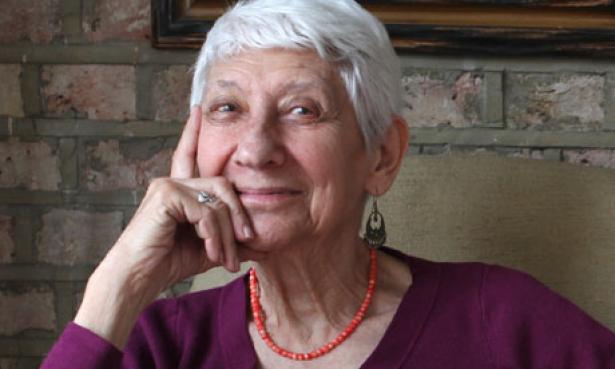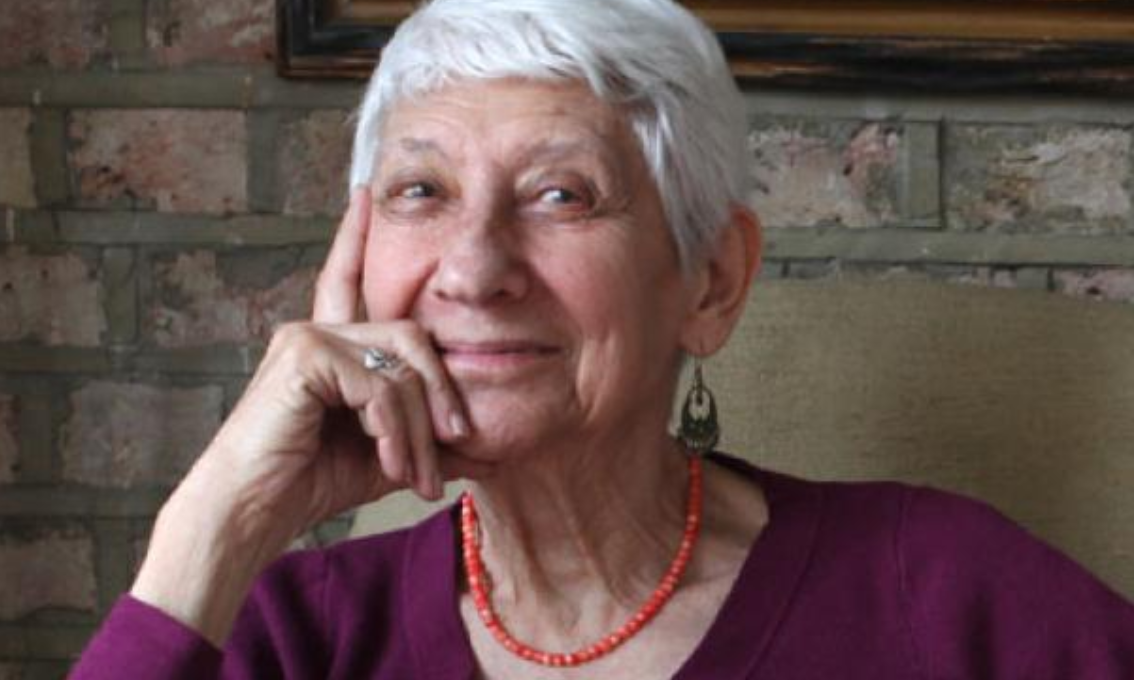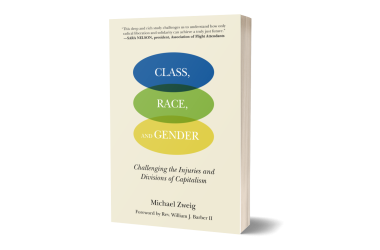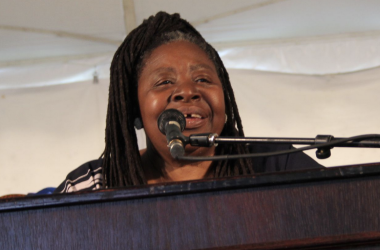By Camila Valle
Portside
January 21st, 2021
 Selma James, Photograph by Eamonn McCabe/The Guardian // Verso Books Blog
Selma James, Photograph by Eamonn McCabe/The Guardian // Verso Books Blog
Camila Valle: I wanted to start with what most people know as the heart of your work: the recognition of unpaid care work, disproportionately done by women. You actually coined the term unwaged work in the 1970s. At the time, the feminist struggle for recognition and compensation most prominently took the form of the Wages for Housework Campaign (WFH), which you helped found and in which you have been active ever since. Could you talk about the development of this work—including into the demand for a care income, one of its contemporary iterations?
Selma James: When I first put forward “wages for housework” in March 1972, I was unsure of the implications. I knew that wages for housework was qualitatively different from wages for housewives, which I had been considering; it spoke about the work and didn’t identify necessarily with women, which I thought—and others did too—was crucial.
I had recently studied volume one of Capital in a reading group—without a teacher. l realized that women reproduce labor power, the basic capitalist commodity, unwaged. That was a new idea then.
A year later, I went on a lecture tour of North America with Mariarosa Dalla Costa and as I spoke with audiences (as an English speaker, I did most of the speaking), I began to understand that we were developing a new perspective that was international and far more comprehensive. Up to then, the working class was defined as waged workers at the “point of production”—the only ones who could make fundamental change. We were redefining the working class to include housewives and all the unwaged. It was not only antisexist, it was antiracist and saw the reproduction of labor power, in fact of the whole human race everywhere, as work at the service of capitalist accumulation. We said if you work for capital, waged or unwaged, you are part of the working class, the subversive class.
I had been at the point of production. My mother had been in a factory since she was twelve years old, up until she had children, and my father was a truck driver who had helped organize a branch of the Teamsters Union in Brooklyn, so I knew about that. But it was only part of the work. Most of the workers in the world, especially at that time, were unwaged workers on the land, mostly women but also men.
Women wanted financial independence to break the power relation with men, and many gained it by going out to work. Most women in industrial countries are now part of the waged workforce. The price has been low wages and the double day—caring squeezed into earlier mornings, later evenings, and weekends. We made clear that almost every woman in the world does housework, physical, emotional, sexual—reproductive work, caring work. We often grow the food that we then prepare to feed families—all this unwaged work keeps the world alive. That has to be acknowledged and women have to be paid for it.
We set out to build a corner of the movement open to all women, and later we worked with Payday, an organization of men who accepted our perspective.
I was raised as a working-class girl in the 1930s, not long after the Soviet Revolution. The movement of the ’30s was fantastic. Whole working-class communities were engaged. But then, in the 1960s and ’70s, people organized along sectoral lines across class. We had to work out how to cross class lines while keeping our working-class perspective. The movements that were forming—not only the women’s movement, but also the Black movement, the welfare rights movement, the lesbian and gay movements, the disability rights movement—were about each sector making its own case and gathering the power to change their situation.
That’s what autonomy enabled: we united across class to end the exploitation and discrimination we suffered. But the class divisions remained and every movement fought it out internally. We maintained our class collectivity by demanding money from the state. The WFH Campaign did that. None of us were intellectuals, but we could think.
The only theory we began with was that we had to break the power relation between women and men based on the disparity of work and wealth. (Marx said: “The individual carries his social power, as well as his bond with society, in his pocket.” [1] He was right, relations under capitalism are mediated by money.) I also brought my experience in the Johnson-Forest Tendency, which centered working-class self-activity as the engine of human liberation. So, we stayed rooted in the housewife on the one hand, and the whole class on the other. This contradiction between the interest of a particular sector and the class perspective is what the WFH Campaign addressed with autonomy, starting with my article “Sex, Race and Class” in 1973 [2]We welcomed women of any class, race, any sector, on the basis of our working-class perspective of women reproducing, first, labor power and then, of course, the whole human race.
We campaigned with single mothers in North America and the UK who got money from the state, which was the first wages for housework. In the United States it was the National Welfare Rights Organization led by Black mothers; in the United Kingdom it was mothers on Income Support.When the governments wanted to cut that money, we fought it; when the women demanded raises, we were involved. This attracted some women like the wife of the head of Chrysler Europe who wanted wages for housework—she was in the Campaign for years. She said, “I work for Chrysler, never get a penny for it, and they never acknowledge my work.” And she told us, with fury, that one of her husband’s associates—well, they’re all dead now so I can speak freely—had told her, “Money is sexy,” as if to say “we men have the power and there is nothing you women can do about it.”
Another woman was married to a minor oil industry executive; she was a great woman, dedicated to the Campaign. For her, the power of an organization demanding money for her work meant that her relationship to her husband and the industry, which persecuted him, and therefore her, was demystified. She was from Texas and lived in Tulsa, Oklahoma, the buckle on the Bible Belt, and was thrilled to be working collectively with Black women and sex workers in the Campaign—she was a spokeswoman for No Bad Women Just Bad Laws. [3]
Many people today consider themselves feminists, by which they mean that they are aware of women’s relative lack of power and they’re against it. But feminists who join those who run capitalism are often chosen by the establishment to define feminism. The movement’s direction has been shunted into women rising into positions of power. The claim that women are liberated if some women take jobs at the top is a capitalist fantasy. The same is true for people of color, and sexuality, and every sector.
CV: How do you see the care income demand coming out of all that?
SJ: From the beginning we had an international perspective and crossed national boundaries. We always said, if you’re washing clothes by the side of the river or in a machine, you are doing the laundry. The level of technology, which makes such a difference to our lives in the city, hides our connection with rural women, especially in the Global South—both caretakers for daily life.
Then there is the question of the environment, which Black Women for Wages for Housework in particular began tackling in the 1980s and ’90s with environmental racism workshops at the UN that brought together struggles against deforestation, mining, and dam building with air and water pollution in the segregated Black areas of the North. There were streets in Newark, New Jersey, that were named “Cancer Alley” because so many people got cancers (often of the same type) from the massive oil industry there. In the UK, we were opposing cruise missiles and nuclear power stations. But we had not bridged the gap between the countryside and the city, which we must do if we are to change anything.
In the summer of 2019, someone we work with told us to read the draft of the Green New Deal for Europe. One of its proposals was a “Care Income to compensate activities like care for people, the urban [and we added the rural] environment, and the natural world.” My partner Nina and I looked at each other absolutely stunned because this built directly on what we had been doing. So, we set out to develop it, spelling out that it was women, starting with mothers, who had been doing most of the caring work all over the planet to accomplish the reproduction of the human race and often of the soil too. We, of course, assumed the Care Income had to be global.
This was embraced by our international network because it can bring together the movement for the survival of all life on earth and our liberation. We were already connected with Haiti, India, Ireland, Peru, Thailand, and Uganda, for example. At first, it looked like two movements coming together—the movement for the environment and the caring for people. But it only looked like two movements from the city, especially in the North. In the South, you know it’s one movement.
CV: That leads me well into my next question, which is about imperialism and your work against it. Imperialism has been central to your analysis—you lived in the West Indies with CLR James, where you were active in the movement for independence and for the federation of the English-speaking islands; you grew up in a Jewish anti-Zionist household; and you’ve worked with and written about the movements in Venezuela, Haiti, and Tanzania. How does it all fit together for you?
SJ: It’s all of a piece. In 1958, when CLR went to the Caribbean for the opening of the new West Indian Federation, they had asked him to stay. He asked what I thought, and I said ok, so the three of us (my young son too) stayed. This was a very different society and I had to find out how capitalism and the movement against it worked there. First, I saw the work that women did. And then I saw how they related to the political movement—that was an eye-opener. The Women’s League of the People’s National Movement in Trinidad and Tobago asked me, because I was the wife of the editor of the nationalist party newspaper (which I worked on as well), to speak at their meeting about my life. After I spoke, I said, “Now you must tell me about your lives.” The women had plenty to say. One woman described—I shall never forget it—what she had to do to come to that meeting: “I got the coal pot ready, I got the meat ready, I got the rice ready, I told him, ‘I’m taking the 8 o’clock bus into town and this is what you must do for the children,’ and I added, ‘I’ve got to go to this meeting. It’s for the nation.’” Every time she wanted to go to a meeting, she told him, “It’s for the nation.” Nobody registered that this was part of the independence movement. It was just women and therefore it was ignored.
Years later, in Venezuela, with Hugo Chávez who wanted to change everything, I realized the role women might have played in the Caribbean independence movement. Chávez sought out the housewives to develop the social services that were needed: the soup kitchens, the health clinics with the Cuban doctors, the deeds to ownership of the houses the people built on the hills around the capital, the literacy classes, everything. When Chávez couldn’t get the state he had inherited to do that work, women enthusiastically took the lead, often doing for free what the state should have paid them for. That was a revolution, and we made exciting films to support it. [4]The Caribbean governments did none of this.
Later, when we were lucky enough to meet Noreen and Ralph Ibbott, who had lived in rural Africa for years and had been dedicated to antiapartheid in Rhodesia and Julius Nyerere’s ujamaa in Tanzania, I understood better the power relations between the governments and the people in the newly independent countries.
Nyerere was anti-capitalist, and he proposed ujamaa—self-governing villages working collectively in the traditional African way, with two differences: first, the men (whom he said are “on holiday half their lives”) must work harder (women “work harder than anyone in Tanzania”); second, agricultural methods could be updated. There was no avoidable death of children in the seventeen ujamaa villages of the Ruvuma Development Association and domestic violence virtually ceased. [5]
In the independence movement, most people in leadership positions saw independence as their route to the top. The grassroots saw it as the possibility of liberating change, though they were skeptical of where the leadership was headed. I saw the struggle for the West Indian Federation, which was the only way to go, destroyed by the ambition of the new rising class—the class that became the state, replacing the British.
Nyerere said about independence, that it was “the preliminary goal” (my emphasis), then you start to build the society you want. When I read this, it made sense of my whole West Indian experience, beginning with the disastrous defeat of the Federation. Independence had become the leaders’ only goal. It was a lesson that I took deeply to heart. Nelson Mandela spent twenty-seven years in prison. Once he came out, his government and his family became millionaires and the white people kept their money, their laws, their homes, and their servants. After independence, the imperialists bought their way back to power via the ambitious. That has been a disaster and deeply demoralizing.
When I first arrived in Trinidad, I saw a small society and felt the movement could easily make great changes. But no matter what the size of the society, the same forces confront you. The institutions that are formed and the personalities that run them are replicas of the same types everywhere, funded by the same imperial powers. Most leaders brought to power by the movement repress it when they take over. Those who don’t are under constant threat as Fidel Castro, Nyerere, and Chávez were, and many, like Lumumba, have been assassinated.
Nowhere has this been truer than in Haiti, where the United States and its network of NGOs have imposed murderous dictatorships and puppet governments. In 2011, I was invited to Haiti to welcome Jean-Bertrand Aristide and his wife and colleague Mildred Trouillot back from exile after the 2004 US-led coup removed him. We found the Aristides, like Nyerere, had no personal ambition and were deeply dedicated to the grassroots movement—that, of course, is why they had been removed.
I must mention Zionism. You know all the arguments: Israel is an apartheid state, it’s part of the Western imperialist bloc, what they call “the free world.” It stands with Myanmar’s genocide of the Rohingya and arms every repressive regime. Marek Edelman, one of the leaders of the Warsaw Ghetto uprising, summed up what I was raised to believe: “To be a Jew means always being with the oppressed and never the oppressors.” We cannot allow Israel to break us from that tradition. We belong with the Palestinian movement—Palestinian lives matter.
CV: I want to focus my last two questions on some of the organizing that you have done over the years, because I think your writings are, perhaps most importantly, organizing tools, and deliberately so. Two struggles I see persisting throughout your work are the struggle for prison abolition and for the rights of sex workers. You have also helped illuminate many of the ways in which these are linked—criminalization, the role of the police and the state, racism, sexism, the context of austerity and economic crisis, and so on.
If you’d like, we can start with the first topic. I know you have been friends with Mumia Abu-Jamal for many years, and were part of the movement to get him off death row and are still campaigning for his release. You also have writings on women prisoners and the power of incarcerated people more broadly in your forthcoming anthology. This work has of course been happening for decades, but I think especially now, in the context of the Black Lives Matter movement, the struggle for police and prison abolition has become a central part of popular consciousness, with many people coming to quite radical conclusions about how society works. Can you say more about that?
SJ: First, thank you for recognizing that my intention when I write is to provide organizing tools. Most come directly from lessons we learnt in the course of organizing. I hope they will help others. Also, people are misled by structures and strictures that come from academia or the “vanguard” left—or both. Endless hours are spent discussing “theory” when, ultimately, the real theory is in what you do and how you do it and with whom and against whom.
Mumia is an extraordinary man—as a teenager he spoke at Fred Hampton’s funeral, and later faithfully reported how the MOVE people who were truly multiracial and alternative, were persecuted, even though he was warned that this would land him in prison. Not death row, not solitary, nothing has shut him up.
He’s such a lovely person. I would do anything for Mumia, just like many who know him. Working with him on editing his book Jailhouse Lawyers, I found out how much prisoners know about the state, down to its lowliest enforcers; prisoners live with it cheek by jowl. [6] Some years ago, I wandered into a workshop of formerly incarcerated people at the Left Forum in Detroit and found it lightyears ahead—they were the most aware of having to work with other sectors in struggle.
Some of us in the United States and the UK have been doing consistent work against mass incarceration, solitary confinement, life without parole, the war on drugs—all this sadistic, racist, sexist, profitable torture. (In the UK, solitary confinement is being defended, even glorified, by the Royal College of Psychiatrists. We are exposing this, particularly in relation to Kevan Thakrar who has been in prison isolation for almost eleven years. [7]) And then the US prisoners’ strikes happened and the most extraordinary thing was that the people who went on hunger strike for sixty days wrote a statement saying “all hostilities between our racial groups will officially cease.” And they did. They communicated in some way in solitary—I have no idea how—and studied books by a number of prisoners like Bobby Sands and Nelson Mandela. They read Howard Zinn’s A People’s History of the United States. And one of the white supremacist prisoners turned over and became one of the leaders of the strike. They told their families, who were supporting them from outside, that they also had to work together across race. It was a major breakthrough that I am not sure everyone has appreciated. Prisoners and formerly incarcerated people are providing leadership to all of us. What they did reminds us of how Fred Hampton crossed sectors as a policy.
Women prisoners have different problems from the men. They are often running a family from prison, worrying about their children, if they are eating and being protected, what is happening with their ailing mother. The men don’t carry that responsibility for others everywhere they go as women do. Women support men who are inside; women also support the women who are inside as well as often taking care of their children, preventing the state from taking them. Again, the women are the carers.
And yes, Black Lives Matter has meant so much everywhere, including in Haiti and Palestine, and it strengthens other movements for justice against murder by the state—the human rights defenders in Honduras and Thailand who are being assassinated by corporate agents for defending Indigenous and small farmers’ right to land, for example.
Women Against Rape in the UK is based at our women’s center so we are familiar with the massive crisis the anti-rape movement is facing all over the world—both in cities and in villages—as the police refuse to pursue rapists (and of course sometimes they are the rapists). The conviction rate for reported rape in the UK is less than 1 percent! Similarly, for domestic violence.
I asked my other dear prisoner friend Maroon Shoats and a couple of his mates what should happen to serial rapists? They were all for putting them inside. But, instead, it is women defending themselves who are more likely to end up in prison!
Of course, mass incarceration and prisons in their present form must be abolished. But we all know war criminals, mass murderers, rapists, and billionaires who are running countries and corporations protected by armies—they should all be inside, the only ones inside, until we are liberated from their power.
CV: You were involved in the English Collective of Prostitutes (ECP) in London starting in the 1970s. Can you talk about that experience?
SJ: I was the first spokeswoman when the ECP was formed within the WFH Campaign. None of the women could be public so they asked me. I was “respectable” and willing to learn. As soon as sex workers became visible as protagonists, much of feminism was hostile. Now some are also attacking trans women, winding up with the religious right. It’s worrying. In the same way, we are facing far-right male supremacists (mainly but not only white), domestic violence deniers who use the family courts to continue to impose their will on women and children. They have the support of the state, including women social workers and judges. It’s a real problem.
CV: One of the arguments that the English Collective of Prostitutes has always made is that there are millions of women who are not sex workers whose sexual lives are shaped by financial considerations—most women, in fact.
SJ: Poverty and unwaged caring work are basic women’s issues. No accident that most sex workers are single mothers, in England as in Thailand. The most immediate issue for sex workers internationally, besides poverty, is decriminalization. The sex worker movement is so powerful and so pervasive that Amnesty International has adopted decriminalization as its policy, a tremendous victory.
The ECP, US PROS, and Empower do a lot of case work, defending money, services, and legal rights. You have to fight for every right and every access and every penny that is yours by right or that you want to make yours by right. That is true for every sector.
In the United States, the Global Women’s Strike which the WFH Campaign coordinates since 2000, has concentrated on legislation that puts money in women’s hands. For example, Gwen Moore and Marcia Fudge (Congressional Black Caucus) have the Worker Relief and Credit Reform Act that redefines work to include caregiving and education, and would give money to mothers and students on little or no income. Although it’s not a lot, it’s a start.
During the U.S. election, we formed the Election Action for Caregivers to help get the anti-Trump vote out, especially among undecided white women. We cited the bills worth voting for. We also mobilized with the Poor People’s Campaign, a breakthrough movement of millions. They are bringing people together against systemic racism, poverty, militarism, and ecological devastation—they call this fusion. They have endorsed the Care Income as part of their Jubilee Platform.
A Care Income would increase the status and the power of carers for people and planet, and for this reason we face opposition from those who want to keep the power in their own hands or in the hands of their masters. With the pandemic and the climate emergency, everybody knows that caring matters. But it’s one thing to win the argument, it’s another to win the struggle. It’s between us and the billionaires.
Organizing for change in particular sectors on the one hand, and the sectors coming together internationally to change everything on the other, is I think the political question of our time.
[Selma James is a women’s rights and antiracist campaigner and author. She is a founding member of the International Jewish Anti-Zionist Network. She coauthored the classic The Power of Women and the Subversion of the Community, which launched the “domestic labor debate.” Her second anthology, Our Time Is Now: Sex, Race, Class, and Caring for People and Planet, will be out by PM Press in February 2021. Her first anthology, Sex, Race, and Class—The Perspective of Winning: A Selection of Writings 1952–2011, was published by PM Press in 2012.
Camila Valle is a socialist feminist editor, translator, and writer in New York.]
[1] Karl Marx, “The Chapter on Money,” in Grundrisse (London:
Penguin, 1973), 157.
[2] “Sex, Race and Class” was first published in Race Today in January 1974.
[3] The No Bad Women initiative worked closely with Black Women for Wages for Housework and the US PROStitutes Collective, campaigning for safety and decriminalization.
[4] Global Women’s Strike, “VENEZUELA: The Bolivarian Revolution ENTER THE OIL WORKERS!,” March 11, 2019, available on YouTube. We also published an open letter (in English and Spanish) to the president of the AFL-CIO that was organizing against the revolution.
[5] Ralph Ibbott, Ujamaa: The Hidden Story of Tanzania’s Socialist Villages (London: Crossroads Books, 2014) tells that extraordinary story. Their ujamaa, backed by Nyerere, was destroyed by his party’s leadership against his will in 1969. It is not to be confused with the 1970s forced “villagization.”
[6] Mumia Abu-Jamal, Jailhouse Lawyers: Prisoners Defending Prisoners v. the USA (London: Crossroads Books, 2011).
[7] Sophie K. Rosa, “Psychiatrists Are Covering for Cruelty in Prisons. A Group of Campaigners Wants to Stop Them,” Novara Media, November 9, 2020.






